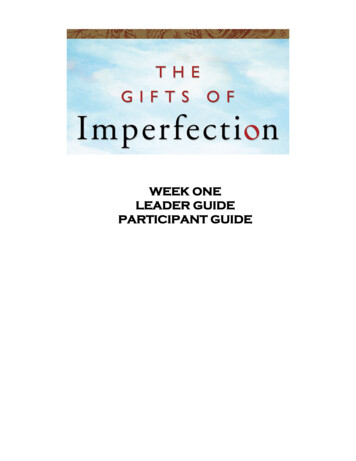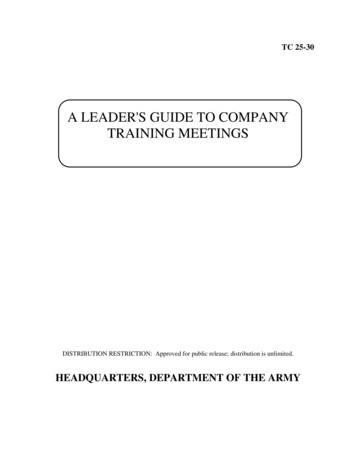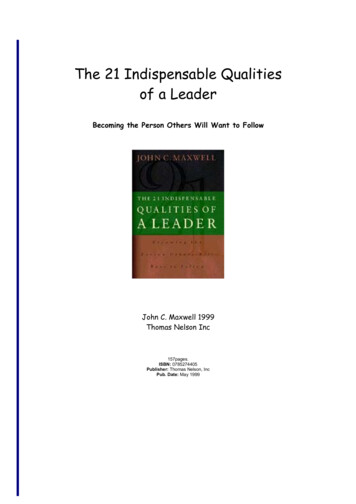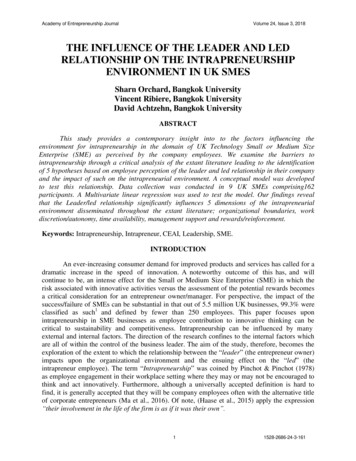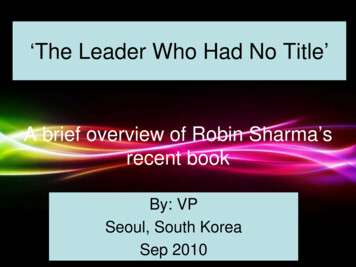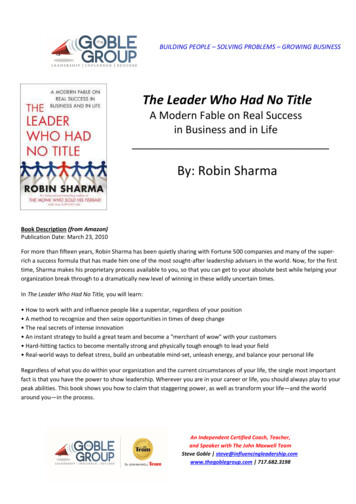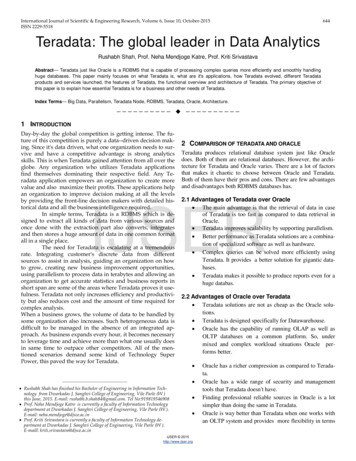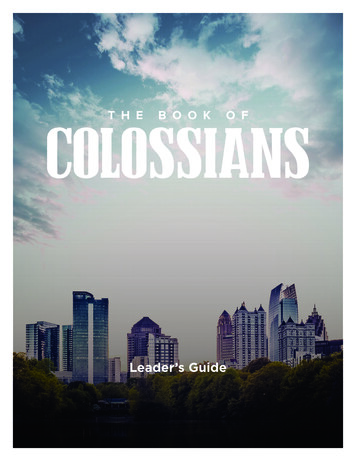
Transcription
Leader’s Guide
RightNow Presents The Book of ColossiansLEADER’S GUIDECopyright 2018 RightNowby RightNow MinistriesMembers of the RightNow team involved in creating this video Bible study include:Brian Mosley: PresidentPhil Warner: VP, Video ProductionPaul Lanum: VP, Publishing & ConferencesMatt Wood: VP, MarketingJackie Mosley: Sr. PublisherWill Irwin: Sr. ProducerJosh Holden: Sr. Producer, DirectorChad Madden: Sr. ProducerMark Blitch: ProducerBrendon Lankford: Producer, CinematographerCourtney Davis: Field ProducerJason Jean: Field ProducerClint Loveness: Field ProducerCameron Rhodes: Field ProducerLee Sherman: Field Producer, Camera 1Austin James: Field Producer, Camera 2Lindsey McNally: Field ProducerLindsie Herring: Field ProducerMark Weaver: Field ProducerJed Ostoich: Associate PublisherSophie DeMuth: WriterMike Marshall: Director of MarketingJared Tohlen: Graphic DesignerISBN - 1-57275-358-7ISBN - 978-1-57275-358-7ALL RIGHTS RESERVED. No part of this book may be reproduced in any manner whatsoever without written permissionfrom the publisher, except where noted on handouts and in the case of brief quotations embodied in critical articles andreview.All Scripture quotations, unless otherwise indicated, are taken from the Holy Bible, New International Version , NIV . Copyright 1973, 1978, 1984, 2011 by Biblica, Inc. Used by permission of Zondervan. All rights reserved worldwide. www.zondervan.com The “NIV” and “New International Version” are trademarks registered in the United States Patent and TrademarkOffice by Biblica, Inc. Scripture quotations are from The Holy Bible, English Standard Version , copyright 2001 by Crossway Bibles, a publishingministry of Good News Publishers. Used by permission. All rights reserved.Doctrinal Statement can be found at rightnow.orgFor information, write:PermissionsRightNow Ministries6300 Henneman WayMcKinney, TX 75070RightNow is a non-profit ministry.Published by RightNowPrinted in the United States of America.
ContentsWelcome Letter . . . . . . . . . . . . . . . . . . . . . . . . . . . . . . . 4A Note to Leaders . . . . . . . . . . . . . . . . . . . . . . . . . . . . . . 5About Louie Giglio . . . . . . . . . . . . . . . . . . . . . . . . . . . . . . 7Session 1: Colossians 1:1–14 . . . . . . . . . . . . . . . . . . . . . . . 8Session 1 Handout: Colossians 1:1–1414Session 2: Colossians 1:15–23 . . . . . . . . . . . . . . . . . . . . . . 15Session 2 Handout: Colossians 1:15–2321Session 3: Colossians 1:24–2:5 . . . . . . . . . . . . . . . . . . . . . 22Session 3 Handout: Colossians 1:24–2:528Session 4: Colossians 2:6–15 . . . . . . . . . . . . . . . . . . . . . . .29Session 4 Handout: Colossians 2:6–1535Session 5: Colossians 2:16–23 . . . . . . . . . . . . . . . . . . . . . .36Session 5 Handout: Colossians 2:16–2342Session 6: Colossians 3:1–17 . . . . . . . . . . . . . . . . . . . . . . .43Session 6 Handout: Colossians 3:1–1749Session 7: Colossians 3:18–4:1 . . . . . . . . . . . . . . . . . . . . . .50Session 7 Handout: Colossians 3:18–4:156Session 8: Colossians 4:2–18 . . . . . . . . . . . . . . . . . . . . . . . 57Session 8 Handout: Colossians 4:2–1862
Welcome LetterIn 2001, I travelled with Louie Giglioacross the country to over 25 cities aspart of their Passion Experience Tour.Night after night, I watched Louie teachyoung adults about what it means toworship God with all of your life. Louie’sheart for God, the Church, and the nextgeneration of Christians still impacts metoday.It was a joy for our team to work withLouie on this video study on the book ofColossians. Louie will walk through theentire book to remind us that our faithis all about Jesus. Jesus is supreme overall creation. When we surrender to Him,it changes everything about how we worship, how we relate toothers, and how we see our sin.This could be a great study to go through by yourself, with asmall group, or even with your family. Our prayer is this studywould draw you into the Bible so God can speak to you throughHis Scripture.The mission of the Church matters!Brian MosleyPresident, RightNow MediaWELCOME LETTER
A Note to LeadersEvery group meeting is an improvisation. No matterhow much you prepare, there’s always a chance thatsomeone will ask a question you can’t answer, or thatthe discussion will go in an unforeseen direction.Maybe someone in the group has a crucial need youhave to address. Maybe the Spirit gives you a newunderstanding of how a biblical teaching applies tothe lives in your group.This Leader’s Guide is a tool that helps you unpack atext. But it can be more than that. We’re giving you adocument full of possibility.If you’re new to group leading, you can simplyfollow along step by step. Remember that your jobis to ask questions, not necessarily to give all theanswers. It’s okay to let silence stretch its arms asyour group thinks through the discussion. As youhonor participant’s answers—even the half-bakedones—they’ll be encouraged to participate even more.Some of those answers may get fully baked in thegroup oven.If you’re accustomed to doing your own thing, go forit! This guide provides ideas to help you do your jobeven better. Whether you’re a novice or a veteran,read through each lesson in advance. Know youroptions. Plan out those parts you’re likely to use.Develop a game plan.We’ve provided handouts to use with each lesson.You’ll need to make enough copies for your entiregroup beforehand so participants can make notesalong the way and remember the Scripture used in theBible study. The handouts also include activities forfurther study during the week.With that in mind, let’s preview the guide. Themain body of the Leader’s Guide is written as aconversation you would have with your group. Whenthere’s a specific question to ask, it appears in boldtype. When we want to whisper directions in yourear, we’ll get your attention with Leader: then useitalic type. (If you’re looking for a quick answer, thesuggested answer sometimes appears in parenthesesafter the question or in an italicized list.) But many ofthe questions are open for discussion, so they haveno suggested answers in parentheses. Instead, theparagraphs that follow after might include thoughtsyou could add to the discussion.HOW TO USE THIS LEADER’S GUIDEEACH LESSON HAS PARTICULARSECTIONS:Session GoalsThis is the point of each session—the big idea andwhat we hope participants walk away knowing,feeling, and doing differently as a result of studyingthe material. All of the teaching, questions, andreflections ultimately point back to these goals.OpenThis is an icebreaker. Adjust it to the character of yourgroup, but don’t skip it, for several reasons. (1) Everygroup needs some transition time. (2) The people getto know each other. (3) The introductory questionsdraw out practical connections between the subjectmatter and their lives.Read & WatchWe often rush into the interpretation of a Biblepassage without really hearing what it says. For thisstudy, we urge you to read the text slowly before youbegin the analysis. Let people drink in the words andimages for themselves. Then the video teaching fromLouie Giglio will make more sense. People will be ableto compare it with their own impressions of the text.Before watching the video, take a moment or twoto walk through the “things to look for” questions.They’ll help concentrate attention on the mostimportant parts of the video teaching. Then, whenyou watch the video, make sure to set the audio at acomfortable level and everyone can see the screen.You don’t want your group to miss anything.Discuss, Go Deeper & Peek at theGreekHere’s the meat of the Bible study: questions aboutthe meaning of the text. The section usually startswith some “easy-answer” questions that reviewwhat the Scripture actually says. But then there aretougher questions about the whys and hows.
A Note to LeadersEvery so often you’ll see a Go Deeper or a Peek at theGreek section. These are optional features, connectingyou to other Scriptures on certain themes foundin Colossians or presenting a look at the originallanguage of the text. You don’t need to use all ofthese. Go through in advance to see which onesseem most promising to you. Here are some factorsto consider: Some people love exploring through the Bible andcomparing references. Others, especially thosewho are rather new to Bible study, get confusedby it. They might not know where to find thoseother books of the Bible, and they might not besure what 1 Corinthians or the Gospel of Johnhas to do with Colossians anyway. In some cases,you could explain what the other passages say,or get individual group members to read theother passages, so the “exploration” is kept toa minimum. Any one of these Go Deeper explorations couldbecome a rabbit trail, leading you away from whatyou intended to cover. Some groups like it thatway, finding new adventures in the comparisonof different parts of Scripture, but if you have aclear agenda for this study, keep a leash on thediscussion. These cross-references serve as a sort of “elastic”for your meeting. If you’re running out of time, youcan drop the Go Deeper content and the lesson willstill make sense. But if you have plenty of time,these explorations can fill it productively. Peek at the Greek sections provide insight into thecareful wording used in the book of Colossians.A discussion of the original language may helpto clarify a sticky issue in the text, so feel freeto reference them as you see fit. However,some groups may find the technical analysisoverwhelming. As with everything, it’s your call.We recommend that you go through the Go Deeperand Peek at the Greek portions in your personalpreparation and choose how you will handle them:yes, no, or maybe. Even the “no” sections will give youhelpful background as you lead the group.Last Word & Live It OutThis is an opportunity for your group to be challengedto do something with what they’ve learned. Thisstudy guide offers a menu of responses. Any one ofthem would be a valuable response to the lesson, butconsider urging the group to respond both inwardlyand outwardly. Many of us are very good at internalresponses in which we treasure the lessons fromColossians we just learned. But actually talkingwith a neighbor? Actually helping someone in need?Keep nudging your group to the more challengingresponses.
AboutLouie GiglioLouie Giglio is Pastor of Passion CityChurch and the Founder of the Passionmovement, which exists to call ageneration to leverage their lives forthe fame of Jesus. Louie and his wife,Shelley, together founded PassionConferences in 1997, uniting collegeaged people in events around the globe.Each year, Passion continues to see18-25 year olds fill venues across thenation in pursuit of lives lived for God’sglory. In 2009, sensing God calling themto extend the heartbeat of Passion tothe local church, they planted PassionCity in the city of Atlanta. In additionto the collegiate gatherings of PassionConferences, Louie and Shelley leadthe teams at Passion City Church,sixstepsrecords, and the PassionGlobal Institute. Louie is the author ofnational-bestseller Goliath Must Fall,The Comeback, The Air I Breathe, I Am NotBut I Know I Am, and Indescribable: 100Devotions About God & Science.Louie and Shelley live in Atlanta,Georgia.ABOUT LOUIE GIGLIO
Session 1:Colossians 1:1–14Quick StartReadPrintWatchTake some time in advance toread and consider the Biblestudy questions and comeup with personal examplesto encourage discussion.Before meeting, make enoughcopies of this session’s handout foryour entire group. The handoutscame with your download.Make sure everyone can seethe screen and the audio isat a comfortable level.Note: For more detailed information, please see the How to Use The Leader’s Guide section on page 5.
Session 1:Colossians 1:1–14Session GoalsEvery session has a point—what each participantshould walk away from the discussion knowing, feeling,and doing.Main Idea: In light of Jesus’s grace, faithfulness, andthe outpour of His love through the Spirit, we shouldallow the Spirit to mature us in faithfulness backto Christ.WatchBefore viewing the session, here are a few importantthings to look for in Louie Giglio’s teaching. As youwatch, pay attention to how Louie answers thefollowing questions.What is the central message of Colossians?Head Change: To know the truth of the gospel and howit directly relates to us.Heart Change: To feel adoration for Jesus because ofall He’s done for us.Life Change: To pursue Christian maturity throughtransformed actions, attitudes, and mindsets.Who wrote Colossians? Why did he write it? Whomdid he write to?OpenShare about a time when you were less mature thanyou are now—maybe a story from your childhood,school days, or first day at a job. What did you do orsay that showed your immaturity?What does it mean to live a life worthy of God?SHOW SESSION 1: COLOSSIANS 1:1–14(13 MINUTES)As we grow in Christ, our habits, attitudes, and wordschange. We become more and more like Jesus thelonger we follow Him. As we’re going to discover inthis study on Colossians, a mature faith begins withfull submission to the supremacy of Jesus. Louie Gigliowill walk us through the first section of chapter oneto show how the simple gospel is the starting point toChristian maturity.DiscussLouie Giglio began the discussion on Colossians withtwo reminders. He first reminded us that the Bible isGod’s breathed-out words to us. God’s teaching usabout Himself through Scripture. Would you say it’seasy to forget that the Bible is God’s word to us?What might the effects be when the Bible has becomemore of a simple book and less of God’s actual word?ReadREAD COLOSSIANS 1:1–14.SESSION 1: COLOSSIANS 1:1–149
Session 1:Colossians 1:1–14How has God’s Word proven to be living and active inyour life? What, specifically, has changed in youbecause of how you’ve interacted with the Biblethrough reading it, listening to sermons, etc.?What expectations do you have for this study? Howdo you hope to change through reading the book ofColossians?READ COLOSSIANS 1:1–2.What details that Louie provided about Paul,Timothy, and Colossae help you understand the letterbetter? How?Leader: If your group is unfamiliar with Paul andTimothy, spend some time reviewing who they arewith your group. Consider reading Acts 9:1–31 forPaul’s story and Acts 16:1–5 and 1 Timothy 1:1–2 forinformation about Timothy.READ COLOSSIANS 1:3–8.According to these verses, how did those in Colossaehear the gospel? Who shared it with them?(Epaphras)Another point Louie talked about was the context ofColossians. Paul wrote Colossians from prisonalongside Timothy. He penned the letter to correctsome wrong theology circulating in the church inColossae by emphasizing the supremacy of Jesus.What do you think of when you hear “the supremacyof Jesus”? How would you define supremacy?What’s interesting about Colossians is Paul didn’tplant this church—Epaphras did. Paul writes to achurch he’s never met before, but still expresses deepcare for them. What kinds of things does Paul pointout about the church in these verses? (Paul pointedout their faith, love, hope, how they’re bearing fruit,and how they understood God’s grace.)How do you tend to express your love for God’speople? What about your faith in Jesus Christ? Yourhope stored in heaven? What does it practically looklike to be full of love, faith, or hope?How would you describe a life fully submitted to thesupremacy of Jesus? What would it look like? What’sappealing to you most about that kind of life?If you had to pick faith, love, or hope to work on,which one would you pick? Why? What might it looklike to improve in that area?SESSION 1: COLOSSIANS 1:1–1410
Session 1:Colossians 1:1–14Paul recognizes the Colossians’ true understandingof the gospel when they first believed. They bore thespiritual fruit of love and faith. Paul continues hisencouragement in the next section of verses.READ COLOSSIANS 1:9–14.When Paul asks believers to live a worthy life, heis telling them to live a life that matches thesalvation they’ve received. How do the actionsmentioned in these verses reflect a changed lifein Christ?Paul mentions for the second time that he andTimothy pray for the church in Colossae. Hespecifically says they never stop praying for them.When has someone modeled this kind of prayerlife for you?In Christ, we are forever changed. He frees usfrom sin and death and brings us into relationshipwith God. But being saved doesn’t mean we cando whatever we want—as Christians we shouldconduct ourselves in a way that reflects the gracewe’ve received.Christians who are more mature than us can give usan example of what it looks like to follow Jesus. Intheir prayers for the Colossians to grow in Christ,Paul and Timothy offer an example of Christianmaturity. They pray that the Colossians would live alife worthy of God. How does Paul describe a worthylife in these verses? (A worthy life is one that bearsfruit, grows in the knowledge of God, is strengthenedby God, endures, is patient, and gives thanks.)If we look back to verse 9, living worthily begins withGod filling us with His knowledge, wisdom, andunderstanding. To Paul, following God begins in themind and heart, and then expresses itself throughaction. What has it looked like in your walk withChrist to grow in knowledge, wisdom, andunderstanding? How have you seen yourmind mature?G O DE E PE RRead more about what Paul says about living aworthy life in the following verses: Rom. 16:1–2; Eph.4:1–3; Phil. 1:27–28; 1 Thess. 2:9–12According to these passages, what kind ofattitude characterizes a worthy life?PEEK AT TH E G REEKWhat do these verses say about how we shouldtreat other people?SESSION 1: COLOSSIANS 1:1–14Paul prays that God would fill the Colossianswith the knowledge of His will. The Greek workfor knowledge is epignosis. When Paul uses thisword, he often refers to the knowledge of God.Rather than knowledge being an intellectualunderstanding of God, Paul uses it to express thepersonal knowledge of God Christians experiencethrough relationship with Him. This type ofknowledge produces wisdom and understanding,but for Paul, mere head knowledge isn’t the endof the line. Knowing God should fundamentallychange us, which trickles down into oureveryday actions.11
Session 1:Colossians 1:1–14What are some things you know are true of God? Howdo you know they are true? How have those truthschanged the way you act?What we think about God and what we do areintrinsically connected. Following Jesus isn’t just ahead knowledge, it’s acting in obedience too. Paulsums up this section in verses 12–14. The reasonwe’re even able to know God and follow Him isbecause of Jesus. He has brought us into a newkingdom—the kingdom of light.Louie put it this way, “It’s not what you do that bringsyou to life spiritually. It’s what God does for you thatmakes you a follower of Jesus and brings you to lifespiritually.” What difference does it make in yourrelationship with God when you operate as if you haveto “do something” in order to gain spiritual life?What kinds of things do we sometimes add to thegospel message? (We sometimes believe we haveto do certain things like read your Bible, pray, tithe,fast, and serve in the local church in order to be aChristian.)Louie reminded us that salvation doesn’t come byour own efforts or by any insider information—whathe called the “secret society.” The Colossians hadadded to the gospel message in several ways. We’llinvestigate those additions throughout this seriesand see how we may have fallen into some of thesame traps.How do you think an incorrect view of the gospel—andof God Himself—could impact someone’s actions?What would their life look like?SESSION 1: COLOSSIANS 1:1–14Have you ever seen that happen in your life? Whatwere you “adding” to the gospel? How did you come torealize what you were doing?Going back to verses 13–14, what does it mean to youthat you’ve been rescued from the kingdom ofdarkness? How does that truth relate to living a lifethat’s worthy of God?PEEK AT TH E G REEKWhen Paul says God has rescued us from thedominion (NIV) or domain (ESV) of darkness,he uses the word exousias. This word refers toauthority, the holder of authority, or a sphereof authority. What Paul means by exousias isthat through Christ, our ultimate authority haschanged. We were once under the exousia—orauthority—of darkness: of Satan, sin, and death.Now through the redemption and forgivenessbrought through Jesus, we have been broughtinto the kingdom of light under the authorityof Christ.As mentioned before, living a life worthy of God is onlypossible through Jesus. He made a way for us to bereunited with God and gives us the Holy Spirit so wecan grow in maturity. That’s not to say we have tostrive to be perfect in our own power. Rather, theSpirit fills us and gives us all we need to pursue12
Session 1:Colossians 1:1–14maturity in Christ—all beginning with the knowledgeof God. When did you first hear and understand thegospel message?Since then, how has the gospel helped you mature asa believer? How has the Spirit played a role in yourmaturity?We also talked about what it means to live a lifeworthy of God in this session. A worthy life looks like atransformed heart, which overflows into how we treatother people, what we say, and our attitude towardsthe things God asks us to do. It begins with God givingus the knowledge of Himself through the Spirit. Thisweek, let’s ask God to help us know Him better andreflect what we know about Him through your actions.Live It OutPray: When you pray this week, thank God fordelivering you from sin and death. Pray for His Spiritto show you what it means to live a life that reflectsthe salvation you’ve received as you study Colossians.Memorize: Commit Colossians 1:13–14 to memory thisweek. Write it on a notecard or create a backgroundfor your phone with the verse. Recite it to yourself toremind you of what God has done for you.What’s one thing you could do this week to remindyourself of the gospel story?Write: Take ten minutes to write out the gospel storyas simply as possible. Reflect on ways you might haveadded or taken away from it and ask God to refreshthe gospel message in you this week.Act: As an expression of gratitude to God, chooseone way to show someone God’s love this week. Helpyour spouse with something on their to-do list, send afriend flowers, or mow the neighbor’s lawn. As you do,pray for the person you’re serving.Last WordThank: Send a thank you text, note, or email to thepeople in your life who led you to Jesus. Tell them howGod used them in your life to grow closer to Him.To be a mature follower of Christ is to know God andHis gospel so fully that it permeates every inch of ourlives. It’s a life full of the Spirit and characterized bylove, hope, and faith. Living this way begins with thesimple truth that God has delivered us from sin anddeath by the work of His Son. We are now under Hisrule, free to follow Him wherever He leads.As Louie mentioned in his teaching, the Colossianshad fallen away from the true gospel, adding to it andmaking Christianity like an exclusive club. They hadforgotten the simple truth we read in verses 13 and 14of chapter one. As we go about this week, let’s remindourselves of the truth of the gospel. Let’s pray Godwould reveal to us the ways we’ve added to the gospelmessage as we study Colossians.SESSION 1: COLOSSIANS 1:1–1413
Session 1 Handout:Colossians 1:1–14Session Big IdeaPersonal Reflection & ApplicationIn light of Jesus’s grace, faithfulness, and the outpourof His love through the Spirit, we should allow theSpirit to mature us in faithfulness back to Christ.How has the gospel helped you mature as a believer?How has the Spirit played a role in your maturity?Things to Look for in the VideoWhat is the central message of Colossians?What’s one thing you could do this week to remindyourself of the gospel story?Who wrote Colossians? Why did he write it? Whomdid he write to?Live it OutWhat does it mean to live a life worthy of God?Bible Study NotesColossians 1:1–14NotesSelect at least one activity below tocomplete before next week.Pray: When you pray this week, thank God fordelivering you from sin and death. Pray for His Spiritto show you what it means to live a life that reflectsthe salvation you’ve received as you study Colossians.Memorize: Commit Colossians 1:13–14 to memory thisweek. Write it on a notecard or create a backgroundfor your phone with the verse. Recite it to yourself toremind you of what God has done for you.Write: Take ten minutes to write out the gospel storyas simply as possible. Reflect on ways you might haveadded or taken away from it and ask God to refreshthe gospel message in you this week.Act: As an expression of gratitude to God, chooseone way to show someone God’s love this week. Helpyour spouse with something on their to-do list, send afriend flowers, or mow the neighbor’s lawn. As you do,pray for the person you’re serving.Thank: Send a thank you text, note, or email to thepeople in your life who led you to Jesus. Tell them howGod used them in your life to grow closer to Him.SESSION 1: COLOSSIANS 1:1–1414
Session 2:Colossians 1:15–23Quick StartReadPrintWatchTake some time in advance toread and consider the Biblestudy questions and comeup with personal examplesto encourage discussion.Before meeting, make enoughcopies of this session’s handout foryour entire group. The handoutscame with your download.Make sure everyone can seethe screen and the audio isat a comfortable level.Note: For more detailed information, please see the How to Use The Leader’s Guide section on page 5.
Session 2:Colossians 1:15–23Session GoalsEvery session has a point—what each participantshould walk away from the discussion knowing, feeling,and doing.Main Idea: Since Jesus is supreme over all things—creation, authorities, the Church. Through Christ,we are reconciled to God, we can stand firm in ourfaith, rooted in the hope of the gospel and Christ’ssupremacy.Head Change: To know Jesus is supreme overeverything in life—creation, authorities both spiritualand not, and the Church.WatchBefore viewing the session, here are a few importantthings to look for in Louie’s teaching. As you watch,pay attention to how Louie answers the followingquestions.What is Jesus supreme over?How does Jesus’s supremacy and the sufficiency ofJesus relate to our worth and purpose?Heart Change: To feel secure in Jesus’s authority overall things and rooted in the hope of the gospel.Life Change: To stand firm in our faith—faithful toGod and obedient to His Word—regardless of anycircumstance.OpenHow do we use the word “supreme” in our culture?(supreme pizza, the Supreme Leader in Star Wars, theSupreme Court, etc.)With those examples in mind, how would you say ourculture defines supremacy? How do you think thatcompares to the biblical definition of supremacy?(Cultural defines supremacy as the best or highestor something that has the most. Biblical supremacyrefers to God’s authority, rulership, and power over allcreation.)Louie Giglio has already mentioned the supremacy ofJesus so far in this study of Colossians. The passagewe’re studying today talks specifically about Jesus—His supremacy, authority, and power. Before we begin,let’s pray that the Spirit would deepen our love andunderstanding of Jesus as we go through this session.ReadSHOW SESSION 2: COLOSSIANS 1:15–23(12 MINUTES)DiscussBefore we dive into this session, let’s review whatwe’ve already discussed in Colossians. Remember thatPaul wrote this letter while in prison with Timothy.He penned this letter to encourage and correct thechurch in Colossae. This church had added to thegospel in several ways—and we’ll talk more about thespecifics of what they added later on in this series.Louie summed up the theme of this book—it’s allabout the supremacy of Jesus over all things. Howdid the supremacy of Jesus apply to the verses westudied in the last session? (Jesus is supreme overour salvation. He rescued us from sin and death by Hisown death. We’re now in His kingdom. See Colossians1:13–14 for a refresher.)As Louie walked through verses 15–23, he pulled outthree characteristics of Jesus. Jesus is the originator,sustainer, and leader. What other initial observationsabout Jesus do you make in these verses?READ COLOSSIANS 1:15–23.SESSION 2: COLOSSIANS 1:15–2316
Session 2:Colossians 1:15–23Verses 15–20 are actually a hymn. Some of your Bibletranslations might even format this part of the textdifferently, like a poem or the lyrics to a song. It’s as ifPaul pauses for a brief moment to exalt Christ byworshipping Him. This section begins by saying Jesusis the image of the invisible God. How did Jesusdisplay the character and nature of God while He wason earth?creation.” The early church counsels deemed this viewheretical, but we still see it pop up among groups suchas Jehovah’s Witnesses. Paul isn’t saying Jesus wascreated. Rather, the term “firstborn” refers to Jesus’sposition of privilege. He exercises authority over allcreation because, as we see in verse 16, all thingswere made through Him and for Him.How does verse 16 describe Jesus’s authority?(He is over heaven, earth, the visible and invisible,thrones, powers, rulers, and authorities because Hecreated them.)Why do you think it matters that all things weremade by and for Jesus?G O DE E PE RRead more about the image of God in Scripture inthese verses: Gen. 1:26–27; Exod. 20:4–6According to these verses, how would youdescribe a biblical definition of “image”? (Animage is someone or something that representsGod. Humans were made in God’s image—in Hislikeness. Idols attempted to make a physicalrepresentation of God on earth.)
Bible study. The handouts also include activities for further study during the week. With that in mind, let’s preview the guide. The main body of the Leader’s Guide is written as a conversation you would have with your group. Wh
